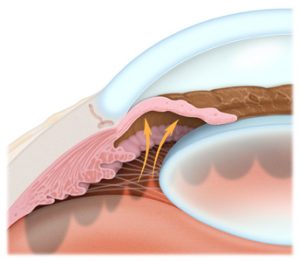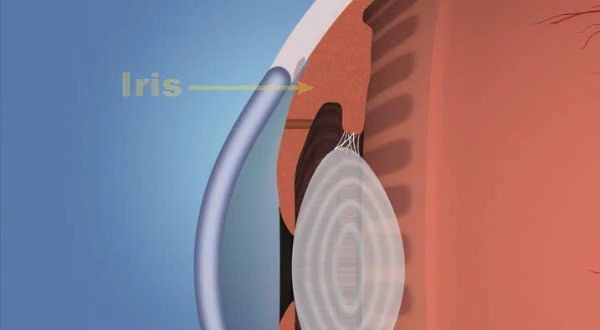What is laser peripheral iridotomy?
 A Laser peripheral iridotomy is a surgical procedure in which a laser is used to create an opening in the iris (the coloured part of the eye) so that fluid can leave the angle of the eye more easily. It is performed for patients with narrow angles, or angles that look like they might be prone to closure. Narrow angles may predispose one to an episode of angle closure glaucoma, in which raised pressure in the eye can rapidly threaten vision and even cause blindness.
A Laser peripheral iridotomy is a surgical procedure in which a laser is used to create an opening in the iris (the coloured part of the eye) so that fluid can leave the angle of the eye more easily. It is performed for patients with narrow angles, or angles that look like they might be prone to closure. Narrow angles may predispose one to an episode of angle closure glaucoma, in which raised pressure in the eye can rapidly threaten vision and even cause blindness.
What happens during the procedure?

This is a modal window.
 This procedure may be performed at a hospital or where there is a laser room. Your ophthalmologist uses eye drops to numb your eye and to make the pupil small. A special contact lens is put on your eye to help direct the laser’s high-energy beam of light at the iris in your eye. The laser makes one or two holes in the iris. You will see a few brief flashes of light and feel little, if any, discomfort. The procedure usually takes less than 5 minutes. You will be able to go home soon after it is done.
This procedure may be performed at a hospital or where there is a laser room. Your ophthalmologist uses eye drops to numb your eye and to make the pupil small. A special contact lens is put on your eye to help direct the laser’s high-energy beam of light at the iris in your eye. The laser makes one or two holes in the iris. You will see a few brief flashes of light and feel little, if any, discomfort. The procedure usually takes less than 5 minutes. You will be able to go home soon after it is done.
What are the risks?
Although there are some risks with the laser treatment such as inflammation, bleeding inside the eye, and raised pressure in the eye, the risks are fewer risks than with other types of surgery. Problems may occur that could threaten your vision, but they are rare. If you have any questions about the risks of this laser treatment, ask your ophthalmologist.
What happens after the procedure?
 You will receive a prescription for a steroid drop from your ophthalmologist after your surgery is completed. Take your usual glaucoma drops as well as the steroid drops four times a day for 5 days to the operated eye(s). Your ophthalmologist will want to check you that afternoon to make sure that the laser iridotomies are still open and working properly. You will typically have an appointment the same day of your surgery to check the eye pressure.
You will receive a prescription for a steroid drop from your ophthalmologist after your surgery is completed. Take your usual glaucoma drops as well as the steroid drops four times a day for 5 days to the operated eye(s). Your ophthalmologist will want to check you that afternoon to make sure that the laser iridotomies are still open and working properly. You will typically have an appointment the same day of your surgery to check the eye pressure.
Your vision will probably be blurred for a short period, but then it should clear in an hour or two. You will not need to wear an eye patch. If your vision does not clear within a day or if you feel any pain or discomfort, call your ophthalmologist. If it is the evening or the weekend and you are having problems, you should go to emergency to be assessed.
This procedure is almost always successful.

